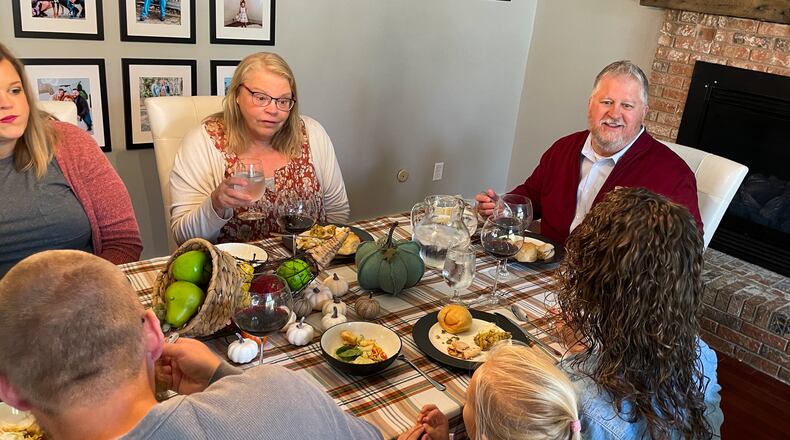After staying away or keeping gatherings small last season, many families are looking forward to getting together this year for Thanksgiving and other winter holidays. Experts say coronavirus vaccines are key to gathering safely. For families wishing to include members who are unvaccinated, partially vaccinated (like newly eligible children) or more vulnerable to severe complications from catching COVID-19, masking, testing, distancing and other precautions can make getting together safer.
Here are answers to some frequently asked questions about celebrating the holidays this year safely amid a pandemic.
Is it safe for families to gather for the holidays this year?
Sara Paton, an epidemiology professor at Wright State University, said it is much safer this year for families to gather compared to last year but each family should assess their own vulnerabilities.
“If you’re vaccinated and you’re healthy, you’ve had your booster, even if you were to get COVID-19, you probably have very little risk of being hospitalized or dying. But maybe not everyone that you’re celebrating with is fully healthy,” she said. “We still have the main tools that we had last year that we should still be using when when we’re vulnerable: keeping our distance, mask use. But now we have a really important tool: vaccinations.”
According to a Kaiser Family Foundation poll from October, about half of U.S. adults plan to attend a large holiday gathering this year, while one in five adults said they will not because of concerns about the pandemic. The poll also found that vaccinated adults were more likely than the unvaccinated to say they are altering holiday plans due to concerns about COVID-19.
Dr. Anthony Fauci, President Joe Biden’s chief medical adviser, has said that it is safe this holiday season for vaccinated families to gather.
“If you’re a vaccinated person, your family is vaccinated and you are in a situation where the people that you interact with are vaccinated, you can have a very good holiday,” Fauci told the New York Times in an interview published on Friday. “You can enjoy the warmth and the companionship of your family on Thanksgiving. You can do the same thing over Christmas.”
However, Fauci cautioned against unvaccinated people gathering and warned of a surge in cases, hospitalizations and deaths that could arise if they do get together.
Dr. Robert Frenck, the director of vaccine research at Cincinnati Children’s, said vaccinated individuals are very unlikely to pass the infection.
“However, if grandma is vaccinated, even if she gets infected (unlikely), the infections tend to be mild,” Frenck said.
In 2021 so far, about 95% of hospitalizations and 96% of deaths from COVID-19 have occurred among the unvaccinated, according to the Ohio Department of Health.
How much protection do partially vaccinated children have?
Many children ages 5 to 11 will only have their first shot in time for Thanksgiving since the shot was only approved for the age group on Nov. 2. The two doses of the Pfizer vaccine for children are administered three weeks apart and individuals achieve full protection about two weeks after the second dose.
Frenck explained that the clinical trials were designed to measure the power of the two-dose series so it’s difficult to estimate the protection conferred by one dose. But he estimates that 14 days after the first dose, individuals may have about 70% protection from COVID-19, which increases to 90-95% protection 14 days after the second dose.
Is it safe to travel?
About 28% of U.S. adults plan to travel for the holidays and 15% will not due to concerns about the pandemic (56% say they don’t normally travel), according to the Kaiser Family Foundation poll.
Experts say it is safe for vaccinated Americans to travel within the U.S. but recommend they wear face masks in communal indoor settings such as planes and airports and practice good hand hygiene.
“If you’re unvaccinated, you might choose to drive so you’re not as exposed,” Paton said. “I’m flying. Me and my family will be wearing N-95 masks when we travel and we’re fully vaccinated.”
Should I ask guests if they’re vaccinated?
A national survey by the Ohio State University Wexner Medical Center released Monday found that about half of respondents will ask about holiday guests’ vaccination status and 46% will require unvaccinated guests to test negative for COVID-19 before the party.
Dr. Iahn Gonsenhauser, chief quality and patient safety officer at the Ohio State Wexner Medical Center, recommends families have a conversation about who is unvaccinated and put precautions into place.
“Unvaccinated individuals really pose the greatest threat, and that’s when it becomes necessary to put some rules and precautions in place, even though those conversations can be a little bit awkward,” he said.
What precautions can families with mixed-vaccination status or vulnerable family members take?
The survey by OSU found that about half of Americans will ask their guests to wear masks at a holiday party, compared to 67% a year ago, and 46% will require unvaccinated guests to test negative for COVID-19 before attending.
Paton suggested the following precautions families with vulnerable family members could take if they want to reduce the chance of spreading COVID-19 at their fathering:
- Consider asking all guests to get tested for COVID-19 a few days before the gathering or take a rapid test the same day and not attend or host a gathering if they test positive. At-home tests are available at many Dayton-area libraries for free and for purchase at convenience stores.
- It’s probably too cold in the Miami Valley to sit outside but you could open a window to increase ventilation
- Individuals, particularly unvaccinated or high risk individuals, could wear a face mask over the nose and mouth when not eating or drinking.
- Unvaccinated and vulnerable family members should consider keeping at least three feet away from other guests at all times.
“I don’t want to tell people not to hug and kiss their family,” Paton said. “But be cautious if somebody’s particularly vulnerable.”
About the Author

